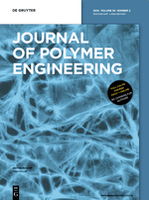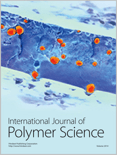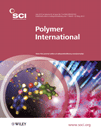
JOURNAL OF POLYMER ENGINEERING
Scope & Guideline
Fostering Collaboration in Polymer Innovation.
Introduction
Aims and Scopes
- Polymer Synthesis and Modification:
Research on the development of new polymer materials and the modification of existing polymers to enhance their properties, including biodegradability, thermal stability, and mechanical strength. - Characterization and Modeling of Polymer Properties:
Studies that involve advanced characterization techniques to understand the physical, chemical, and mechanical properties of polymers, often supported by theoretical and numerical modeling. - Biopolymers and Green Chemistry:
Exploration of sustainable and biodegradable polymers derived from natural resources, including their synthesis, properties, and applications in reducing environmental impact. - Nanocomposites and Hybrid Materials:
Investigations into the integration of nanoparticles and other fillers into polymer matrices to enhance performance characteristics such as strength, conductivity, and thermal stability. - Polymer Processing Technologies:
Research focusing on innovative processing techniques such as injection molding, extrusion, and 3D printing, aimed at optimizing the manufacturing processes and improving the final product quality. - Biomedical Applications of Polymers:
Studies that highlight the use of polymers in biomedical fields, including drug delivery systems, scaffolds for tissue engineering, and other healthcare-related applications. - Environmental Applications and Waste Management:
Research that emphasizes the role of polymers in environmental applications, such as water purification, waste management, and recycling technologies.
Trending and Emerging
- Smart and Responsive Polymers:
Research into polymers that can respond to environmental stimuli (temperature, pH, light) is on the rise, reflecting increased interest in applications such as drug delivery and self-healing materials. - Sustainable and Biodegradable Polymers:
The focus on developing eco-friendly polymers, including biopolymers and those derived from renewable resources, has gained momentum as environmental concerns become more prominent. - Advanced Polymer Composites:
The trend towards incorporating advanced materials, such as graphene and carbon nanotubes, into polymer matrices to enhance mechanical, thermal, and electrical properties is increasingly popular. - Additive Manufacturing and 3D Printing of Polymers:
Research surrounding the use of 3D printing technologies for creating complex polymer structures is rapidly expanding, driven by its potential for customization and efficiency in manufacturing. - Polymer Applications in Energy Storage and Conversion:
Emerging research focuses on the use of polymers in energy-related applications, including batteries, fuel cells, and supercapacitors, highlighting their role in sustainable energy solutions. - Antimicrobial and Antifouling Polymers:
The development of polymers with antimicrobial properties is increasingly relevant in healthcare and environmental applications, particularly in response to rising concerns about infections and biofouling.
Declining or Waning
- Traditional Polymer Applications:
Research on conventional applications of polymers, such as basic packaging and textiles, has decreased as the field shifts towards advanced and niche applications, including smart materials and biomedical uses. - Basic Polymer Chemistry:
The focus on fundamental polymer chemistry, such as simple polymerization methods, has waned in favor of more complex synthesis techniques and applications that provide immediate societal benefits. - Low-Performance Polymers:
Studies centered around low-performance polymers without significant enhancements or modifications are being overshadowed by research emphasizing high-performance and multifunctional materials. - Single-Function Polymers:
The exploration of polymers with singular functions has decreased, as the trend moves towards multifunctional materials that can serve multiple purposes, such as self-healing, conductive, or antimicrobial properties.
Similar Journals

JOURNAL OF POLYMER RESEARCH
Illuminating Innovations in Materials ChemistryJOURNAL OF POLYMER RESEARCH is a leading peer-reviewed journal published by SPRINGER, specializing in the dynamic fields of polymer science, materials chemistry, and organic chemistry. Operating since 1994, this esteemed journal has consistently delivered high-quality research articles that illuminate the latest advancements and innovations in polymer technology. With an increasing impact factor and placed in the Q2 category for both Materials Chemistry and Polymers and Plastics, it stands as a valuable resource for researchers, professionals, and students seeking cutting-edge knowledge in these areas. The journal is indexed in Scopus, highlighting its significance in the academic community, with notable rankings in Materials Science and Organic Chemistry. While it does not currently offer open access options, the meticulous selection of research and thorough peer-review process ensures each article's contribution to the field is both robust and impactful. Researchers aiming to expand their understanding and engage with pioneering studies will find JOURNAL OF POLYMER RESEARCH an indispensable platform.

POLYMER BULLETIN
Connecting Researchers through Cutting-edge Polymer InsightsPOLYMER BULLETIN is a prominent journal in the field of polymer science, published by SPRINGER in Germany. Established in 1978, this peer-reviewed journal focuses on the latest research and developments in polymer chemistry, materials science, and condensed matter physics, boasting a commendable impact factor indicative of its rigorous academic standards. With a Q2 ranking in multiple categories including Chemistry (Miscellaneous), Condensed Matter Physics, Materials Chemistry, and Polymers and Plastics, POLYMER BULLETIN serves as an essential resource for researchers, professionals, and students aiming to stay abreast of innovative findings and methodologies within these interdisciplinary landscapes. Although the journal does not currently offer open access, it provides invaluable insights and data that significantly contribute to the advancement of polymer science. For more information and to access published articles, visit the journal's page on the Springer website.

International Journal of Polymer Science
Innovating the Future of Polymer ScienceInternational Journal of Polymer Science is a prominent and peer-reviewed journal dedicated to advancing the field of polymer science. Published by Hindawi Ltd, this open-access journal has been making significant contributions to the discipline since its inception in 2009, ensuring that research findings are accessible to a global audience. With an impressive impact factor and positioned in the Q2 quartile for Polymers and Plastics as of 2023, it ranks 46th out of 161 in the Scopus database, reflecting its strong standing in the research community. The journal welcomes innovative research across various topics within polymer science, including synthesis, characterization, and applications in diverse industries. By providing a platform for scholars, professionals, and students, the International Journal of Polymer Science not only encourages the dissemination of knowledge but also fosters collaboration and innovation in this essential field. Based in Egypt and operating under a rigorous selection process, it remains a vital resource for anyone involved in polymer research.

ADVANCES IN POLYMER TECHNOLOGY
Empowering Innovation in Polymer Science.ADVANCES IN POLYMER TECHNOLOGY is a premier open-access journal that has been at the forefront of innovation in the field of polymer science and engineering since its inception in 1981. Published by WILEY-HINDAWI, this journal serves as a vital platform for researchers, professionals, and students alike, facilitating the dissemination of cutting-edge research and applications in chemical engineering, organic chemistry, and polymers and plastics. With an impact factor that signifies its relevance and quality, the journal has achieved notable rankings, including Q2 in Chemical Engineering, and ranks within the top 30% of its category in multiple disciplines as of 2023. ADVANCES IN POLYMER TECHNOLOGY has embraced open-access publishing since 2019, ensuring that research findings are widely available to the global academic community. With its comprehensive coverage of topics related to polymer technology, this journal not only fosters scholarly exchange but also aims to bridge the gap between fundamental research and practical applications, thereby contributing significantly to advancements in materials science.

POLYMER JOURNAL
Advancing the Frontiers of Polymer SciencePOLYMER JOURNAL, published by SpringerNature in the United Kingdom, is a premier academic platform dedicated to the field of polymer science. Since its inception in 1971, this journal has become an essential resource for researchers and professionals interested in the latest advancements in materials chemistry, polymers, and plastics. With its robust H-index and a consistent ranking in the top quartiles of its categories—Q2 in both Materials Chemistry and Polymers and Plastics—POLYMER JOURNAL demonstrates a strong impact in the scientific community. It holds significant recognition in Scopus rankings, occupying the 68th percentile in Materials Chemistry and the 67th percentile in Polymers and Plastics. The journal's commitment to publishing high-quality research articles enables it to serve as a key reference point for innovative studies, theoretical developments, and practical applications in polymer science. Although it is not an open-access journal, researchers and students gain valuable insights through its extensive archives and rigorous peer-reviewed content, making POLYMER JOURNAL a vital source of knowledge for anyone engaged in this dynamic field.

POLYMER SCIENCE SERIES A
Unveiling the Future of Polymer SciencePOLYMER SCIENCE SERIES A is a distinguished journal dedicated to the field of polymer science, with a focus on advancing knowledge in materials chemistry and polymers and plastics. Published by MAIK NAUKA/INTERPERIODICA/SPRINGER, this journal provides a platform for researchers and practitioners to disseminate their findings and innovations. With an ISSN of 0965-545X and an E-ISSN of 1555-6107, it is widely accessible to the academic community. Although currently non-open access, the journal has maintained its significance since its inception in 1991, boasting an evolving emphasis on contemporary issues in polymer science up to 2024. Ranked in the Q3 category for both Materials Chemistry and Polymers and Plastics in 2023, POLYMER SCIENCE SERIES A plays a crucial role in the broader academic landscape, particularly for those committed to understanding and enhancing polymer materials. The journal’s reputation is solidified by its Scopus rankings, where it addresses critical advancements and fosters collaborative research opportunities within the community. We invite researchers, professionals, and students to explore the valuable insights published within these pages.

MACROMOLECULAR RESEARCH
Unlocking the Potential of Polymers WorldwideMACROMOLECULAR RESEARCH, published by the POLYMER SOC KOREA, is a premier journal dedicated to advancing the field of macromolecular science and polymer engineering. With its ISSN 1598-5032 and E-ISSN 2092-7673, this journal has emerged as a vital platform for researchers and professionals interested in the application and development of polymers across various domains. Based in South Korea and operating as an open-access resource since its inception in 2002, MACROMOLECULAR RESEARCH consistently ranks in the Q2 category across diverse fields such as Chemical Engineering, Materials Chemistry, and Organic Chemistry as per the latest 2023 metrics. Notably, it is recognized for its substantial contributions to polymery science, increasing its visibility and impact in global research. By providing a forum for original research articles, reviews, and innovative methodologies, this journal aims to foster collaboration and knowledge sharing among scientists, engineers, and students alike. Join a community that is at the forefront of polymer research by exploring the wealth of resources and cutting-edge studies featured in MACROMOLECULAR RESEARCH.

Journal of Polymer & Composites
Unveiling Breakthroughs in Material Science and Engineering.Journal of Polymer & Composites, with ISSN 2321-8525 and E-ISSN 2321-2810, is an esteemed academic journal published by STM JOURNALS, dedicated to the advancement of knowledge in the rapidly evolving fields of polymer science and composite materials. The journal serves as a pivotal platform for researchers and professionals, offering cutting-edge research articles, reviews, and case studies that explore innovative developments and applications in polymer chemistry, material science, and engineering. Although currently lacking an impact factor citation, the journal aims to foster dialogue among academia and industry partners, addressing the latest trends and breakthroughs that drive the field forward. With a commitment to scholarly excellence, the Journal of Polymer & Composites is positioned as an essential resource for enhancing the understanding of polymer composites and their multifaceted applications. Notably, STM JOURNALS' reputation for quality publications underscores the journal’s importance in facilitating impactful research and educational initiatives worldwide.

POLYMERS FOR ADVANCED TECHNOLOGIES
Pioneering New Horizons in Polymer TechnologiesPOLYMERS FOR ADVANCED TECHNOLOGIES is a premier peer-reviewed journal published by WILEY, focusing on cutting-edge research in the field of polymers and plastics. Since its inception in 1990, the journal has established itself as a critical resource for academics and industry professionals alike, reflecting advancements and innovations in polymer science and technology. With an impressive Scopus ranking of #45 out of 161 in the Materials Science category and a 72nd percentile ranking, it ranks in the Q2 quartile for its relevance and impact within the polymers field. The journal's comprehensive scope encompasses recent developments and trends in polymer applications, synthesis, and characterization, making it essential reading for researchers looking to advance their work within this dynamic area. Researchers can submit their work in the UK, where the journal is published, and while it does not currently offer open-access options, its robust impact factor highlights the significance of the research it disseminates. Join the community of experts pushing the boundaries of polymer science by engaging with POLYMERS FOR ADVANCED TECHNOLOGIES. Continuous exploration and innovation await those who contribute to and learn from the journal’s diverse array of studies.

POLYMER INTERNATIONAL
Pioneering Discoveries in Polymer TechnologyPOLYMER INTERNATIONAL is a leading journal in the field of polymer science, published by Wiley, one of the most esteemed scholarly publishers. With an ISSN of 0959-8103 and an E-ISSN of 1097-0126, this journal has been a pivotal platform for researchers since its inception in 1991, now extending its coverage until 2024. The journal boasts a commendable standing in various scientific domains, achieving a Q2 quartile ranking in Materials Chemistry, Organic Chemistry, and Polymers and Plastics as of 2023. Additionally, it holds impressive Scopus ranks, including Rank #47 in Organic Chemistry and Rank #40 in Polymers and Plastics, placing it within the top percentiles of its categories. Researchers, professionals, and students alike can benefit from its rich array of articles that contribute to the understanding and advancement of polymer technology and materials science. Although not an open access journal, POLYMER INTERNATIONAL remains crucial for disseminating high-quality research that drives innovation and development within the field.